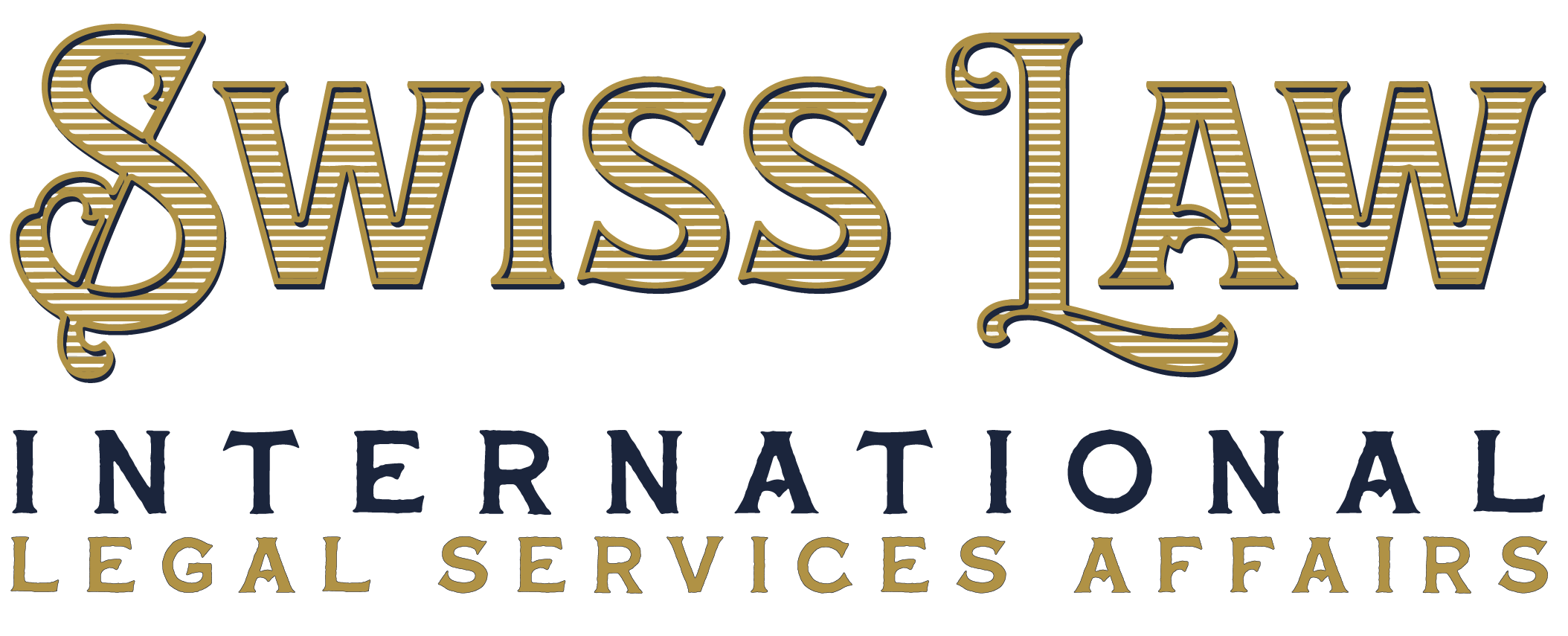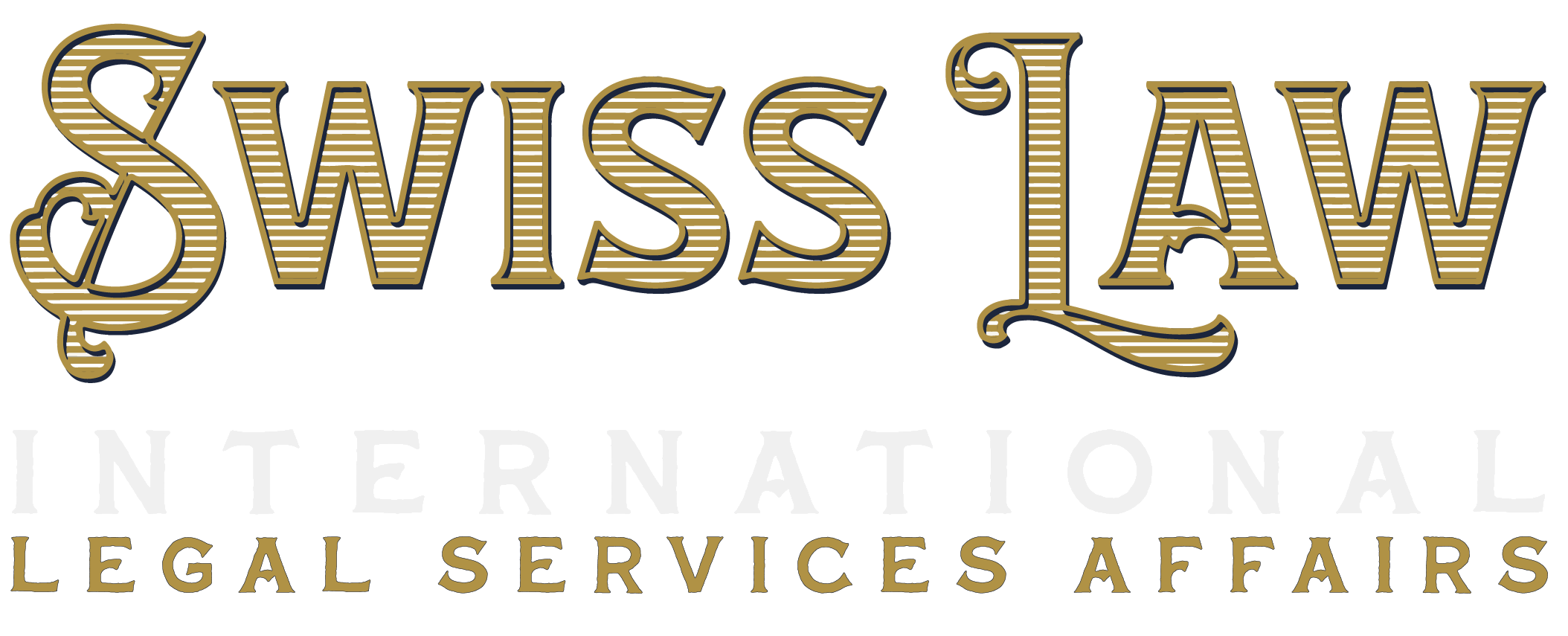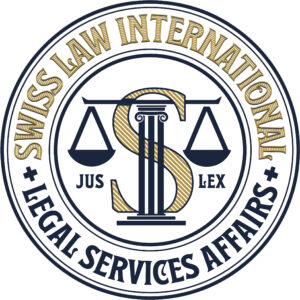CHI SIAMO?
L'azienda madre, SWISS LAW INTERNATIONAL OÜ, con sede in Estonia, si assume la piena responsabilità legale per la sua controllata, SWISS LAW INTERNATIONAL GmbH. La sede principale della nostra organizzazione è situata a Navar Mountain 5, Central City, Tallinn, contea di Harju, nella regione di Eastland. Il codice postale associato a questo indirizzo è 10117.
Siamo in grado di fornire supporto completo e guida relativa a varie richieste e sfide legali. Di conseguenza, si ottiene un'assistenza competente e si familiarizza con successo con le complessità giuridiche della Svizzera e dell'Estonia.
La nostra azienda ha aperto uffici in altre località, tra cui Estonia, Zurigo, Spagna e Repubblica Dominicana. I nostri servizi sono comodamente accessibili in più sedi e possediamo l’esperienza per offrire un supporto competente in vari ambiti legali.
SWISS LAW INTERNATIONAL è una società di consulenza legale specializzata in assistenza e consulenza legale. La consulenza legale si basa principalmente su Zurigo, il diritto amministrativo svizzero. Le nostre aree di competenza comprendono diritto svizzero dell'immigrazione, consulenza legale, diritto del lavoro, diritto immobiliare, ristrutturazione del debito, consulenza legale in diritto di famiglia (separazione e divorzio), diritto penale, diritto internazionale pubblico, diritto privato, diritto europeo e costituzione di imprese.
Nessuna delle suddette o altre attività fraudolente sopra menzionate coinvolgono SWISS LAW INTERNATIONAL. Tieni presente che non conduciamo operazioni promozionali aggressive tramite indirizzi e-mail personali o Internet come gmail.com, hotmail.com o yahoo.com. Inoltre, non effettuiamo spesso transazioni commerciali tramite SMS o messaggi istantanei. Le azioni illegali di terzi che utilizzano il nome di SWISS LAW INTERNATIONAL in modo improprio non sono responsabilità di SWISS LAW INTERNATIONAL, dei suoi assistenti legali o del suo personale. Ti invitiamo a contattare il nostro team legale al telefono o all'indirizzo e-mail fornito su questo sito Web se hai domande o noti comunicazioni sospette su SWISS LAW INTERNATIONAL.
TERMINI DI UTILIZZO:
SWISS LAW INTERNATIONAL (LLC) è un'organizzazione di servizi legali con sede in Svizzera che collabora con partner professionali e soci fondatori (Member Firms) con sede a Zurigo. Il suo obiettivo principale è fornire consulenza legale e altri servizi professionali alla propria clientela. Le aziende associate sono strutturate e governate in linea con i prerequisiti locali, legali e normativi pertinenti. La designazione SWISS LAW INTERNATIONAL viene utilizzata solo per ragioni descrittive e non deve essere interpretata come indicante alcun tipo di affiliazione o appartenenza a una società a responsabilità limitata tra le imprese costituenti. La delimitazione della responsabilità per i servizi forniti ai clienti è stabilita nelle lettere di incarico scambiate tra il membro e il cliente. Secondo il linguaggio spesso utilizzato nelle organizzazioni di servizi professionali, le denominazioni "partner" o "amministratore" si riferiscono a una persona che ricopre la posizione di partner, amministratore o equivalente all'interno di un'azienda membro. Allo stesso modo, la parola “impresa” comprende qualsiasi azienda membro partecipante all’interno dell’organizzazione. Il sito web SWISS LAW INTERNATIONAL, gestito dallo studio di consulenza legale o da uno degli studi membri, serve solo come fonte di informazioni. Il contenuto presente sul sito web SWISS LAW INTERNATIONAL non mira a stabilire un rapporto assistente-cliente o qualsiasi altro accordo contrattuale, né fornisce consulenza legale o professionale su alcun argomento.
Spetta al lettore chiedere attivamente assistenza al proprio rappresentante legale. Si consiglia vivamente agli individui di astenersi dal prendere qualsiasi decisione o intraprendere qualsiasi azione esclusivamente sulla base delle informazioni fornite sul sito web di SWISS LAW INTERNATIONAL. Prima di prendere qualsiasi decisione o intraprendere qualsiasi azione, è essenziale ricevere assistenza da esperti legali o professionisti pertinenti. SWISS LAW INTERNATIONAL e le sue aziende associate non possono essere ritenute responsabili per eventuali perdite o danni derivanti dall'uso o dall'affidamento sul contenuto fornito sul sito web SWISS LAW INTERNATIONAL. Inoltre, declinano ogni responsabilità per eventuali azioni o omissioni intraprese da clienti o lettori a seguito dei dati presentati sui siti web SWISS LAW INTERNATIONAL. Per qualsiasi domanda sul contenuto di SWISS LAW INTERNATIONAL, contattare Juan Fabián, l'amministratore delegato. Il sito web di SWISS LAW può contenere collegamenti ipertestuali che portano ad altri siti web, mentre questi siti web esterni possono anche includere collegamenti ipertestuali che rimandano a SWISS LAW INTERNATIONAL. SWISS LAW INTERNATIONAL e le sue affiliate declinano ogni responsabilità per il contenuto o il funzionamento di tali siti Web e non accettano alcun obbligo relativo al contenuto e al funzionamento di tali siti Web esterni. È possibile che parte del materiale presente sul sito SWISS LAW INTERNATIONAL possa essere considerato contenuto promozionale per un professionista legale, in conformità con le normative stabilite dall'ordine degli avvocati di riferimento. Se ritenuta rilevante, in linea con le norme sopra citate viene formulata la seguente affermazione: Questa comunicazione funge da una sorta di pubblicità paralegale. Le decisioni passate potrebbero non garantire sempre un risultato comparabile. Si consiglia inoltre di rivolgersi all'organismo di regolamentazione d'ambito per ulteriori dettagli sulle imprese associate, oltre alla suddetta nota legale.
LOTTA CONTRO LA CORRUZIONE E LA BUGLARITÀ
SWISS LAW INTERNATIONAL è obbligato ad aderire a una vasta gamma di leggi anti-concussione e anti-corruzione in diverse giurisdizioni. Nello specifico, ma non solo, il Foreign Corrupt Practices Act degli Stati Uniti e l’Anti-Bribery Act del Regno Unito. Lo studio, insieme ai suoi avvocati, ai dipendenti delle assicurazioni legali e ai clienti, nonché ai suoi fornitori di servizi, è soggetto a una serie di doveri in conformità con la legislazione anti-corruzione e anti-concussione. Ci atteniamo a queste responsabilità e forniamo indicazioni ai nostri clienti sull'attuazione dei loro impegni. La nostra organizzazione ha implementato politiche complete, programmi di formazione e protocolli operativi per applicare in modo efficace la legislazione anti-concussione e corruzione su scala globale. Si prega di leggere attentamente il nostro Codice di condotta.
AVVISO LEGALE E-MAIL
Tieni presente che se hai ricevuto un'e-mail da SWISS LAW INTERNATIONAL, il contenuto del messaggio e-mail e tutti i file di accompagnamento sono destinati solo al destinatario e possono includere informazioni proprietarie e private. Di conseguenza, chiunque legga questo messaggio non è il destinatario previsto o un dipendente o rappresentante autorizzato responsabile dell'invio di questo messaggio al destinatario previsto. Si avvisa inoltre tale persona che è severamente vietato modificare, condividere, duplicare o utilizzare in qualsiasi altro modo il presente messaggio o i suoi allegati. Nel caso in cui abbiate ricevuto inavvertitamente un messaggio, è imperativo informare tempestivamente il destinatario previsto rispondendo al messaggio e rimuovendolo quindi dal proprio sistema informatico. Tieni presente che effettuiamo analisi automatizzate di tutte le e-mail in arrivo, sia internamente che tramite un fornitore di servizi esterno, al fine di filtrare le e-mail commerciali indesiderate, note anche come spam. Esiste la possibilità che un'e-mail valida venga erroneamente scartata prima di essere esaminata dal destinatario previsto all'interno della nostra organizzazione. Ti preghiamo di informarci se questo filtro automatico causa qualche inconveniente.
LA PRESENTE COMUNICAZIONE HA LO SCOPO DI FORNIRE UN PANORAMICA SULLE POSTE ELETTRONICHE E TELEFONATE FRAUDOLENTE RELATIVE ALL'SWISS LAW INTERNATIONAL.
SWISS LAW INTERNATIONAL è ben riconosciuto come un importante studio legale e società di consulenza nell'Europa meridionale e nel mondo, con una forza lavoro consistente che comprende diversi professionisti legali e membri dello staff provenienti da diverse nazioni. Purtroppo, le dimensioni e l'importanza della nostra organizzazione attirano talvolta l'attenzione di persone senza scrupoli che dichiarano con l'inganno di essere affiliati a SWISS LAW INTERNATIONAL e/o utilizzano l'identità della nostra azienda per perpetrare attività ingiuste contro individui ignari. Internet è pieno di casi di frode e altri pericoli per la sicurezza. Di conseguenza, si consiglia vivamente agli individui di adottare misure per salvaguardare il proprio benessere personale e la riservatezza dei propri dati. È nostra normale procedura denunciare questo tipo di illeciti alla polizia, ma la natura e la portata di queste frodi rendono impossibile per la nostra azienda fermare completamente l'uso illegale del marchio SWISS LAW INTERNATIONAL e delle identità dei nostri avvocati. Recentemente sono stati fatti diversi commenti errati su SWISS LAW INTERNATIONAL. Ci sono stati casi in cui individui si sono rappresentati fraudolentemente come membri dello staff di SWISS LAW INTERNATIONAL, con l'intenzione di offrire opportunità di lavoro o sollecitare informazioni personali e costi di iscrizione tramite e-mail. Queste attività fraudolente spesso comportano lo svolgimento di “interviste online” attraverso piattaforme come Google Hangouts o anche interviste telefoniche. Inoltre, questi individui potrebbero affermare falsamente di essere associati a un'azienda che utilizza SWISS LAW INTERNATIONAL come riferimento legale o contatto per scopi simili. Ci sono stati casi in cui individui si sono impegnati in attività fraudolente presentandosi fraudolentemente come dipendenti di SWISS LAW INTERNATIONAL. È stato scoperto che questi individui inviavano fatture false, accompagnate da istruzioni di bonifico bancario fraudolente, con l'intento di ingannare i destinatari inducendoli a effettuare pagamenti. Ci sono stati casi in cui è stato scoperto che alcuni individui si spacciavano fraudolentemente per avvocati affiliati a SWISS LAW INTERNATIONAL. Questi individui sono stati visti impegnati in attività di riscossione rivolte ai clienti, comprese tattiche coercitive come la minaccia di sospendere o impedire i pagamenti fino alla consegna urgente di contanti. Ci sono stati casi in cui è stato scoperto che alcuni individui assumevano identità fraudolente come professionisti legali affiliati a SWISS LAW INTERNATIONAL. È noto che questi individui si impegnano in pratiche ingannevoli, come sollecitare trasferimenti monetari immediati a presunto beneficio di un membro della famiglia che ha subito un incidente automobilistico o un altro disastro imprevisto. Inoltre, l'individuo in questione è stato visto inviare presunte segnalazioni agli organi giudiziari, chiedendo un tempestivo intervento. L'enumerazione sopra fornita non è una raccolta esaustiva delle attività fraudolente, poiché gli autori dei reati escogitano sempre nuove strategie. Il sito web ha subito una violazione della sicurezza che ha consentito a gruppi criminali organizzati di manipolare alcune pagine e inserire testi senza autorizzazione, comprese le frasi “Siamo uno studio legale” e “Siamo avvocati”. Successivamente, hanno pianificato di avviare un procedimento legale contro il nostro partito, presentando le prove testuali che avevano scritto per farci sembrare colpevoli. L'assoluzione da parte della Procura è stata concessa sulla base del fatto che non possiamo essere ritenuti responsabili per il materiale mostrato sul nostro sito web. Questa vulnerabilità deriva dalla suscettibilità di questi sistemi alla manipolazione non autorizzata da parte di attori malintenzionati, come hacker o criminali.
COSA DEVI FARE?
Per segnalare casi di probabili frodi che coinvolgono e-mail, numeri di telefono o altre questioni correlate, si raccomanda agli individui di chiedere assistenza alle forze dell'ordine o alle autorità amministrative locali competenti. Presso l'Internet Crime Complaint Center (IC3) del Federal Bureau of Investigation (FBI), sia gli individui che le aziende negli Stati Uniti hanno la possibilità di denunciare crimini informatici, frodi e reati correlati. Inoltre, il sito web dei reclami della Federal Trade Commission (FTC) funge da piattaforma per segnalare episodi di furto di identità, frode, truffe perpetrate da truffatori, nonché reclami riguardanti denaro contraffatto, tra le altre questioni. È possibile accedere a una serie di risorse informative relative alla criminalità informatica all'interno dell'Unione europea tramite l'Autorità europea di polizia (Europol). On Guard Online offre inoltre indicazioni su come tutelarsi e segnalare potenziali casi di frode online, oltre a fornire collegamenti ad altri siti Web governativi. Se qualcuno riceve un'e-mail o una telefonata minacciosa in cui afferma di provenire da SWISS LAW INTERNATIONAL che offre un lavoro o chiede denaro o informazioni personali, dovrebbe mettersi in contatto con tale azienda.
- Si prega di assicurarsi che qualsiasi comunicazione con questa persona venga condotta solo tramite le informazioni di contatto fornite sul nostro sito web ufficiale, www.swisslaw.ch. Si prega di astenersi dall'utilizzare indirizzi email, numeri di telefono o messaggi di testo alternativi per scopi di comunicazione. Nel caso in cui il mittente utilizzi un indirizzo e-mail che non proviene da SWISS LAW INTERNATIONAL o affermi che il proprio account SWISS LAW INTERNATIONAL sta riscontrando difficoltà, è imperativo sottolineare fermamente la necessità di impegnarsi in comunicazione solo con il mittente tramite i dettagli di contatto forniti sul nostro Sito ufficiale.
- Si consiglia di intraprendere il processo di verifica dell'account, che può includere vari metodi come la verifica telefonica, per stabilire l'autenticità dell'identificazione del chiamante. Un approccio efficace potrebbe essere quello di comunicare con il legale principale dell'azienda per confermare la validità del chiamante.
- Si consiglia di non fornire fondi monetari a chiunque effettui telefonate o invii e-mail.
- Si consiglia di astenersi dal rivelare informazioni personali o finanziarie, come dettagli del conto bancario o numeri di carta di credito, al mittente di un'e-mail o al chiamante.
- Si consiglia di denunciare tempestivamente la posta elettronica falsa e di contattare le forze dell'ordine o altre autorità competenti.
Inoltre, è consigliabile adottare alcune misure quando si incontra un'e-mail potenzialmente fraudolenta che è direttamente associata o sembra essere associata alla nostra organizzazione. Ad esempio, se ricevi un'e-mail da un indirizzo e-mail SWISS LAW INTERNATIONAL "falsificato" che non termina con il "DOMINIO E-MAIL SWISS LAW INTERNATIONAL" designato, suggeriamo di implementare le seguenti linee guida: Si consiglia di astenersi dall'accedere o interagire con qualsiasi collegamento ipertestuale incluso all'interno della lettera elettronica.
- Si consiglia di astenersi dall'accedere o scaricare eventuali allegati inclusi nell'e-mail.
- Si consiglia di astenersi dal rispondere alle email o dal divulgare dati personali o sensibili.
- Si consiglia di non inviare fondi in risposta alla lettera elettronica.
- Nel caso in cui lo si ritenga necessario, è consigliabile inoltrare l'e-mail potenzialmente dubbia al dipartimento informatico (IT) della propria organizzazione e richiedere la valutazione dell'autenticità del messaggio.
- Rimuovi definitivamente il messaggio dal tuo account email.
Nel caso in cui tu abbia domande sulla sicurezza del tuo computer o sospetti riguardo a potenziali compromissioni della sua sicurezza, ti consigliamo vivamente di contattare il team di supporto del dipartimento di informatica del tuo istituto, il produttore del tuo computer o il tuo fornitore di servizi Internet . SWISS LAW INTERNATIONAL declina ogni responsabilità nelle suddette attività o in qualsiasi altra attività fraudolenta. Va notato che la nostra organizzazione si astiene dal partecipare ad attività commerciali assertive tramite piattaforme di posta elettronica Internet come gmail.com, hotmail.com, yahoo.com o account personali. In un contesto più ampio, non è consuetudine condurre operazioni commerciali utilizzando piattaforme di messaggistica di testo o di messaggistica istantanea. SWISS LAW INTERNATIONAL, i suoi professionisti legali e il suo personale declinano ogni responsabilità per le azioni illecite commesse da qualsiasi soggetto esterno che si appropri indebitamente dell'identità dell'organizzazione. Nel caso in cui tu abbia dubbi o incontri comunicazioni dubbie relative a SWISS LAW INTERNATIONAL, ti chiediamo gentilmente di contattare il nostro consulente legale utilizzando il numero di telefono o l'indirizzo di posta elettronica fornito su questo sito Web.
COPYRIGHT E RIPRODUZIONE
SWISS LAW INTERNATIONAL, fondato nel 2023, possiede i diritti di proprietà intellettuale su questo documento, che è protetto da copyright. La frase "Tutti i diritti riservati" viene spesso utilizzata per indicare che il detentore del copyright conserva i diritti esclusivi sull'opera e che qualsiasi utilizzo o riproduzione non autorizzata è proibito. I trattati internazionali sul copyright proteggono il contenuto del sito web SWISS LAW INTERNATIONAL. La riproduzione di gran parte del contenuto del sito Web è consentita purché (I) le copie siano pubbliche e non a scopo di lucro; (II) viene dato credito a SWISS LAW INTERNATIONAL; (III) le copie non vengono modificate o mostrate in modo da travisare qualsiasi parte del contenuto del sito web; e (IV) gli amministratori del sito web vengono informati delle riproduzioni. L'autorizzazione alla creazione di copie inverse non si estende all'incorporazione di una sezione significativa del sito web in qualsiasi opera o pubblicazione, indipendentemente dal mezzo (stampato, elettronico, ecc.), o per intenzioni commerciali.








